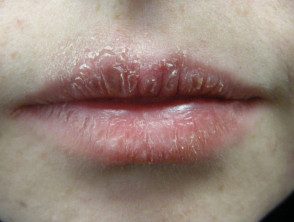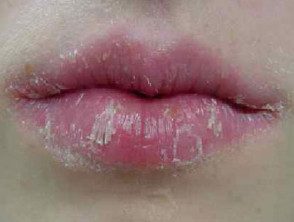What is cheilitis?
Cheilitis means inflamed lips. There are several causes
What is exfoliative cheilitis?
Exfoliative cheilitis is a rare reactive condition that presents as continuous peeling of the lips.
Factual cheilitis can present as exfoliative cheilitis when it is due to factual or attention seeking behavior or a haunting–compulsive tendency to pinch or chap the lips (exfoliative).
Who gets exfoliative cheilitis and why?
Exfoliative cheilitis is rarely reported, but it appears to affect both sexes equally and primarily affects young adults under 30 years of age.
Some patients diagnosed with exfoliative cheilitis actually have a located form of psoriasis
Factual cheilitis can be triggered by a stressful event that leads to an element of self-destructive behavior.
Whatever the underlying cause, exfoliative cheilitis can get worse if:
- Mouth breathing
- Licking lips
- Lick lips
- Lip
- Bite the lip
- Bacterial (Staphylococcus aureus) or yeast infection (Candida albicans)
Poor oral hygiene has also been reported in association with exfoliative cheilitis and is considered a possible predisposing trigger. One form of the condition is associated with HIV infection.
Whatever the cause, excessive curb the formation results in abnormal flaking.
What are the clinical features of exfoliative cheilitis?
Exfoliative cheilitis presents with continuous peeling of the vermilion (outer) part of the lips. It can affect only one lip, usually the lower one. The lip may appear normal or red before the formation of the thickened surface layer. The exfoliation appears to be cyclical and proceeds at different speeds at different sites, so there is always a part of the exfoliation of the lips at any one time. There may be associated bleeding that results in the formation of a hemorrhagic Cortex. When both lips are involved, the lower lip is generally more affected than the upper lip.
Exfoliative cheilitis

Exfoliative cheilitis

Exfoliative cheilitis
The condition can be painful and cause difficulty eating and speaking. Other reported symptoms include sensations of:
- Tingle
- Chop
- Dryness
Ulceration or fissure it can happen.
Depression and personality disorders have been commonly reported in association with factitious exfoliative cheilitis. However, cheilitis itself can appear so unsightly that the patient avoids social situations, which contributes to altered mood.
The typical course of exfoliative cheilitis is chronic over several years It can fluctuate, getting worse with more stress. Spontaneous improvement has been reported, but often recurs.
How is exfoliative cheilitis diagnosed?
Because exfoliative cheilitis can resemble other conditions, tests are required to exclude these other conditions and secondary infection.
- The swabs should evaluate for candida and Staphylococcus aureus.
- A biopsy must be done but histopathology can be nonspecific
Exfoliative cheilitis is a diagnosis of exclusion and there is no specific diagnostic test for it. A care psychiatric Evaluation may be especially helpful as treatment for an associated mood or anxiety disorder has also been reported to improve factitious exfoliative cheilitis.
What is the treatment for exfoliative cheilitis?
Infection, if present, should be treated topically or systemically.
Unless a predisposing or associated condition can be identified and treated, exfoliative cheilitis is usually resistant to treatment. Unsuccessful use of keratolytic lip balms, sunscreen, antifungal creams, current steroids systemic steroids, antibiotics, vitamin D analogs (calcipotriol) and cryotherapy have been described.There has been a report on the successful use of topical tacrolimus and Calendula officinalis (calendula) ointment 10%
Treatment of an associated mood or anxiety disorder has been reported to improve factual cheilitis. Obsessive compulsive disorders respond better to selective serotonin reuptake inhibitors.

